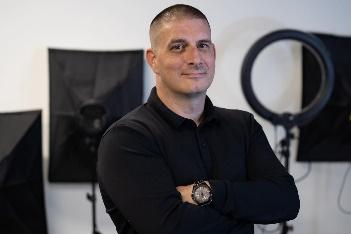The skills needed to get into the Cultural and Creative industry are pretty much what they’ve always been: the ability to communicate, cooperate, work hard and demonstrate your passion for your chosen creative field. Of course, specific technical skills are needed too: it’s no good wanting to be an actor for example if you’ve never set foot on any stage or found other opportunities to start to learn your craft. But young people can learn technical skills with their employer too, and what employers want are people who are passionate, willing to learn, willing to give and willing not to give up. Young people who have those skill sets are bound to make a good start in the cultural and creative industries.
Read on to hear from Nick Owen, CEO of The Mighty Creatives and Yasin El Ashrafi, Managing Director of HQ Recording Studios in Leicester and their advice for young people.
Key advice
A question often asked by young people wanting to get into the industry is “Where do I get started?” With the ever changing, ever evolving world of work, it’s difficult to feel like the path ahead is linear. In the early stages, volunteering, work experience, and simply talking to as many people as you can who are already in the industry, can give you meaningful encounters and an honest insight into what the industry could look like for you.
Unfortunately, many young people don’t get enough exposure to the world of work at school or college, which can lead to career confusion and ambiguity when thinking about next steps. So, stay ahead of the game and take ownership of the direction you’re heading into!
Going into the Cultural and Creative sector doesn’t mean you have to go to university. You will need to find a route that suits you, and with the growth of many technical and vocational routes available, do your research to find what fits your needs best.
The sector is currently experiencing a skills shortage, perhaps surprisingly, in digital skills like coding. By having this knowledge and being aware of how and where technology is changing all the time can keep your skills relevant and ahead of the curve.
When looking at the currently skills required of young people entering the music industry, Yasin said:
“The things I look for when taking on young people into my creative roles is passion, motivation, a creative spark, and the willing to learn. Patience and persistence are other key attributes, as opportunities do not come straight away.”
Nick said: “Of course, we appreciate that there are many barriers to working in the sector: often these come down to peers and family members not recognising that it is a sector in the first place. Aspiring creatives may often be told to ‘get a proper job’ – but the days of the ‘proper job’ are well and truly over anyway, and in actual fact, the cultural and creative sector has been recognised in the UK as being one of the fastest growing economic sectors for some time now.
My advice would be not to let anyone put you off getting a job in the sector by suggesting it’s not a ‘real job’: the routes into and through the sector are many and various and, armed with your passion, curiosity and tenacity you will go far. Consider establishing a portfolio career which is fascinating, challenging and rewarding too.”
What future skills and jobs might be out there in the next 10-15 years that young people should be aware of?
Trying to estimate what future skills and jobs might be out there in the next 10-15 years is a tricky task. Back in 2006 hardly anyone had heard of Facebook or other social media; now there are many jobs in that field alone which we couldn’t have predicted, whether they be in content creation, marketing or technical skills, the jobs in that field have blossomed in a way we could never have anticipated.
When thinking about future skills and jobs that might be available in this industry, Yasin said he predicts an increased need for technical and digital skills:
“I expect there to be a lot of virtual and mixed realities. This will require an understanding of binaural audio, web programming, and strong virtual networking skills and web presence.”
Nick’s advice for preparing for the future is: “Young people can be prepared for the cultural, social and economic shifts that will be heading their way in the years to come by keeping your eyes, ears and mind open and being prepared to never stop learning. That way, you’ll be prepared for whatever comes next and be able to adapt quickly to any challenges.”
What is your best piece of advice for a young person at the beginning of their career journey?
Having realistic expectations of the sector and being prepared to work hard is important to know. Employers are also impressed with applicants having some work experience under their belt.
For Yasin, “Believe in yourself, trust the journey, and make sure you enjoy what you are doing, because it may be a long road ahead.”
Nick said, “Anyone considering a job in the cultural and creative sector, could get a very good head start by asking themselves what they really want – what is their driver and passion? Even a glimmer of an answer to those questions will help a young person seek employment or further training opportunities which will feed that passion!”
Working in the cultural and creative industries leads to a fulfilled, satisfying and memorable life: not just for individuals, but for our wider world too.
See our LLEP World of Work series which breaks down the Creative and Cultural sector and many others for the Leicester and Leicestershire area here.
 | Dr. Nick Owen, CEO of The Mighty Creatives, Leicester |
 | Yasin El Ashrafi, Managing Director, HQ Recording Studio, Leicester |
 | Sonal Morjaria, Employer Engagement Enterprise Coordinator at the LLEP Careers Hub |









0 Comments